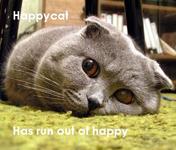|
EDIT: Can a mod make the poll multiple choice? I can't seem to fix it.
I just realized that the title of this post sounds like a women's magazine quiz. No, I'm talking about the official types/features of depression: melancholic, atypical, catatonic, psychotic, postpartum, and seasonal affective disorder. Also agitated depression/mixed state found in bipolar disorder.
Note that people with bipolar can also answer this.
Melancholic:
In depression with melancholic features, either a loss of pleasure in almost all activities or a lack of reactivity to usually pleasurable stimuli is present. Additionally, at least 3 of the following are required:
A depressed mood that is distinctly different from the kind that is felt when a loved one is deceased
Depression that is worse in the morning
Waking up 2 hours earlier than usual
Observable psychomotor retardation or agitation
Significant weight loss or anorexia
Excessive or inappropriate guilt
Atypical:
An episode of depression may be identified as having atypical features. Characteristics of this subtype are mood reactivity and exclusion of melancholic and catatonic subtypes in addition to 2 or more of the following for a period of at least 2 weeks:
Increased appetite or significant weight gain
Increased sleep
Feelings of heaviness in arms or sensitivities of the legs that extend far beyond the mood disturbance episodes and result in significant impairment in social or occupational functioning
Reversed diurnal mood change (ie, severity worse in the evening than the morning)
Catatonic: (you can answer this one if you know someone who had it as they likely can't speak for themselves)
Depression With Catatonic Features
Diagnosis of depressive episodes with catatonic features requires at least 2 of the following, according to the DSM-IV-TR:
Motoric immobility in the form of catalepsy or stupor
Motor overactivity that seems purposeless and not in response to external stimuli
Extreme negativism or mutism
Voluntary movement peculiarities such a posturing, grimacing, stereotypy, and mannerisms
Echolalia or echopraxia
Psychotic:
The presentation of severe major depressive disorder may include psychotic features. Psychotic features include delusions and hallucination and may be mood congruent or mood incongruent. Mood-congruent psychoses are often consistent with classic depressive themes, such as personal inadequacy, guilt, disease, or deserved punishment. Mood-incongruent psychoses are not consistent with these typical themes but may also occur in depression.
Major depressive disorder with psychotic features is considered a psychiatric emergency. Patients may require psychiatric hospitalization.
Postpartum (as a result of childbirth)
Seasonal affective disorder (as a result of the time of year)
Agitated depression:
In the context of mental disorder, a mixed state, also known as dysphoric mania, agitated depression, or a mixed episode, is a condition during which features of mania and depression, such as agitation, anxiety, fatigue, guilt, impulsiveness, irritability, morbid or suicidal ideation, panic, paranoia, pressured speech and rage, occur simultaneously.
Typical examples include tearfulness during a manic episode or racing thoughts during a depressive episode. One may also feel incredibly frustrated or be prone to fits of rage in this state, since one may feel like a failure and at the same time have a flight of ideas. Mixed states are often the most problematic period of mood disorders, during which susceptibility to substance abuse, panic disorder, commission of violence, suicide attempts, and other complications increase greatly.
__________________
All that we see or seem
Is but a dream within a dream.
|








 Linear Mode
Linear Mode

